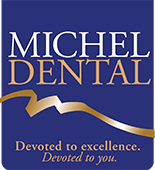Has anyone ever said to you, “I have TMJ”? Well, guess what—we all have TMJ. TMJ is the acronym for temporomandibular joints. These are the joints located just in front of each ear that connect your lower jaw to your skull. Your TMJs allow you to open and close your mouth so you can eat, talk, smile, laugh and yawn. TMJ dysfunction happens when these joints do not function properly. Consequently, there may be pain and discomfort when you move your jaw. Topeka TMJ dentist Dr. Michel offers non-surgical relief for TMJ dysfunction sufferers.
TMJ and You
It is easy to take your TMJs for granted. For most of us, they function perfectly well and aren’t a problem. You can easily feel your TMJs at work when you’re chewing just by gently placing your fingertips on the side of your face in front of your ears. The movement may be simple, but the system at work is really quite complex. There is bone, cartilage and muscle that must all work in unison so you can open and close your mouth, or move your jaw from side to side.
TMJ Dysfunction
What causes TMJ dysfunction? There are number of circumstances that dentists believe may contribute to the development of TMJ dysfunction. These include:
- A traumatic injury to your face, neck or head
- Arthritis in the joint
- Teeth grinding and clenching at night or during the day due to stress
- A misaligned bite
The Symptoms of TMJ Dysfunction
More often that not, people with TMJ dysfunction feel pain when they attempt to open or close their mouth. Sometimes the pain is not restricted to the jaw only, but may radiate and cause a headache or neck and shoulder pain, too. Other symptoms include:
- Fatigued facial muscles
- Feeling like your jaw is locked or stuck in one position
- A popping sound when you open or close your mouth
- Facial swelling
- A toothache, but no infection or cavity
- An earache, but no infection
Curing TMJ Dysfunction in Topeka
With years of training and experience, Dr. Michel is able to diagnose and treat TMJ dysfunction. He will first evaluate your jaw, your bite and the way your jaw moves when your chew. Then, he will be able to target the source of the problem and determine how best to realign your jaw. For many patients a customized oral appliance called a mouthguard can be worn at night to relieve the stress of any teeth grinding or clenching and promote better jaw alignment.
Call Our Office Today
If you or a family member is experiencing any of the symptoms mentioned above, then call Topeka family dentist Dr. Michel to schedule a consultation. Dr. Michel has dental offices in Topeka and Silver Lake.
